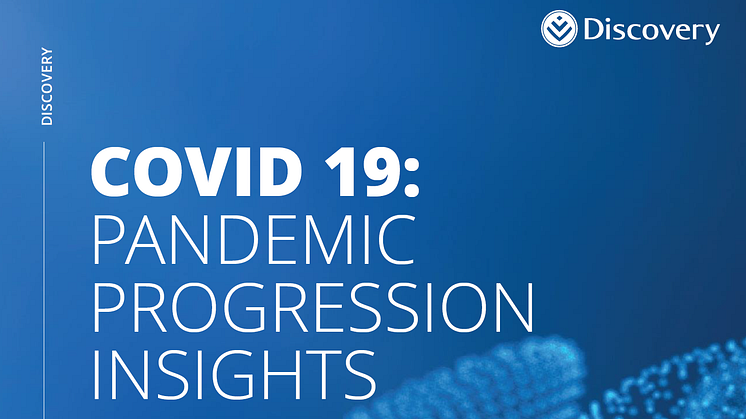
Press release -
Discovery data insights show that up to 16 000 South African lives will have been saved from COVID 19 related deaths, by 2021 as a result of efforts to curb the spread of COVID-19
Thursday, 10 September 2020, Johannesburg – “The COVID-19 pandemic continues to significantly impact our country on multiple levels, not least of which is the toll on human life and health, and the far-reaching consequences of the economic impact,” says CEO of Discovery Health, Dr Ryan Noach.
“However, we are encouraged by research that indicates that, by the end of 2020, up to 16 000 South African lives will have been saved as a result of our country’s early lockdown and related measures instituted to curb the spread of COVID-19 in our country. The data also shows that, as a result of these decisions, we have achieved lower infection fatality rates when compared with other countries globally.”
“These clinical and epidemiological benefits are demonstrable, and the prevention of loss of life in South Africa is an outstanding achievement. However, in the context of this excellent performance, we remain cognisant of the potentially long-lasting economic impact and realities of the lockdown. The primary aim of our national lockdown – to save lives – has been achieved. We must continue the national effort to prevent a second wave of infection and accelerate the rebuilding of our economy.”
Encouraging signs that South Africa has effectively navigated the peak of the pandemic
Globally, the number of COVID-19 cases continues to rise. “There are clear signs that South Africa has effectively navigated the peak of the local epidemic with staggered hotspot outbreaks resulting in longer, flatter regional peaks and lower infection fatality rates than the global experience,” explains Discovery Health’s Chief Actuary, Emile Stipp. “Despite the extent and complexity of comorbidities in the South African population, it is clear that the delayed timing of the outbreak, the contained regional attack rates (number of new COVID-19 cases per 100,000 lives) and an effective national response, have kept infection fatality rates at 0.3%.”
Up to one quarter of South Africans might have been infected with COVID-19
National statistics indicate that, by 9 September, South Africa had experienced in excess of 640 000 infections and 15 000 deaths relating to COVID-19. “However, global research shows that an extraordinary number of COVID-19 cases remain undiagnosed with an estimated rate of asymptomatic cases varying in the literature from 40% in some studies to up to 75%1,” says Dr Noach. “We have looked further into these insights.”
The South African Medical Research Council (SAMRC)2 regularly publishes information on deaths in the country and their data shows an inordinate increase in natural deaths (“excess natural deaths” not recorded as linked to COVID-19) over the period of the pandemic, compared to historical data.
“Based on SAMRC data, up to 24 August 2020, estimates indicate that the real COVID-19 death rate could be up to 3.1 times higher than that reported. Extrapolating from these insights, based on the infection fatality rate at the outset of the epidemic - which has reduced as treatment improved - Discovery Health estimates that approximately 13 million South Africans have been infected. This represents an infection rate of 22%, affecting approximately one quarter of people in the country.”
These findings are consistent with the initial results of a seroprevalence survey conducted by the Cape Town Metro3, indicating that 37% of pregnant women and 42% of people living with HIV had tested positive for COVID-19 antibodies, indicative of previous infection with COVID-19.
Discovery Health scheme member base accounts for 11% of reported national COVID-19 infections
“We continue to analyse the Discovery member base experience of COVID-19,” says Discovery Health's chief commercial officer, Dr Ron Whelan. Insights from 19 medical schemes administered by Discovery Health (3.5 million lives covered) include 79 000 cases of COVID-19 (12 % of the national reported experience of the pandemic), 14 300 hospitalisations and 1 500 deaths.
COVID-19 transmission rates are highest amongst economically active adults working in the services
sector
Discovery’s data shows infection rates among members aged 20 to 40 years old – economically active people – are 1.7 times higher than for people aged 60 and over. Within this population, the highest infection rates have been recorded among those working in the healthcare and servicing sector, where face-to-face interaction is required, further bearing out the importance of social distancing as a preventative strategy. Dr Whelan adds, “Our findings make it clear that we must continue to implement measures aimed at limiting exposure to COVID-19, such as working from home where this is feasible.”
Discovery’s data also shows that in children, COVID-19 is often undiagnosed as its presentation is typically asymptomatic or mild.
Older members and those with chronic conditions face the highest risk of severe illness due to COVID-19.
Discovery’s advanced disease risk modelling further shows that:
- Older membersandthose who have chronic diseases face the highest risk ofsevere illness when they contract COVID-19.
- People over age 60 have between a 22% and 34% elevated risk of being admitted to hospital on contracting COVID-19, relative to similar, 40-year-old people. These findings align to international research.
- The most prevalent chronic conditions amongst Discovery Health Medical Scheme members are diabetes, hypertension and hypercholesterolemia. These conditions increase the risk of COVID-19 related hospitalisation by 27%, 11% and 7% respectively.
- The more chronic conditions a person has the higher their COVID-19 hospitalisation risk with members experiencing an elevated risk of admission of between 20% (for one condition) and 86% (for six or more chronic conditions).
Healthy living is key to offsetting risk of severe illness and hospitalisation in older people and those living with chronic conditions
In May this year, Discovery released the results of its Resilience Index showing that increased physical activity (assessed through engagement in Vitality) could lower the relative risk of being hospitalised to treat COVID-19.
Discovery’s new analysis adds to this picture. Dr Whelan explains: “Engaged Vitality members experience, on average, 37% lower mortality risk than non-engaged members. COVID-19 related mortality risk is even lower for members with higher levels of engagement.”
Engagement in Vitality can:
- Offset the elevated COVID-19 risk associated with aging. A 65-year-old male, with no chronic conditions, who exercises for half an hour at least four times a week, has the same mortality risk from COVID-19 as a 45-year old who exercises once a week.
- Offset the elevated COVID-19 risk associated with lifestyle-related chronic conditions. A 45-year-old male with hypertension, but highly engaged in healthy behaviours, has the same risk as an unengaged 45-year-old male without chronic conditions.
Convergence of data-driven insights to identify high risk members and enable remote monitoring at home, has significantly improved outcomes for high risk members
Discovery’s deployment of advanced data insights has facilitated the identification of high-risk Discovery Health Medical Scheme members. “Remote patient monitoring is fundamental to preventative care and improving outcomes among these members when they contract COVID-19,” explains Head of Discovery Health’s Centre for Clinical Excellence, Dr Noluthando Nematswerani.
“To date, we have funded General Practitioner-based care at home, including remote monitoring with pulse oximeters for 7564 proactively identified high-risk members. This has enabled regular monitoring of oxygen saturation levels in their blood, and the early detection of the onset of silent hypoxia. This monitoring happens remotely, while the patient stays in the safety and comfort of their home.” Silent Hypoxia, a very dangerous aspect of COVID-19, is an unnoticed reduction in oxygen levels over time.
Discovery Health Medical Scheme’s unique funding for this care at home, including the remote monitoring, has lowered the risk of admission in these individuals by 27%, decreasing case severity by 10% and improving mortality outcomes by an astounding 38%. “These are the results of preventative care offered through the convergence of advanced data capabilities, discerning insights, proactive remote care by family physicians and the mobilisation of funding for innovative out-of-hospital care,” adds Dr Nematswerani. “We are really proud of these results as they show that this intervention has saved lives.”
The clinical and behavioural interventionsthat have supported South Africa through the pandemic
“A range of measures have defined the country’s successful management of the pandemic,” adds Dr Nematswerani. Limiting people’s movement played a significant role in flattening the curve and delaying the peak of the pandemic. The level 3 lockdown through August continued to alleviate strain on the healthcare system by reducing trauma-related admissions to 13% of pre-COVID-19 levels. “Enhanced hygiene practices also substantially limited the spread of other seasonal respiratory tract infections reducing the burden on the healthcare system.”
Advancements in treatment insights around the use of cortisone, high flow nasal oxygen and anti-coagulants, improved the management of COVID-19 cases. Discovery Health Medical Scheme members who have benefited from these treatment forms have experienced:
- A 56% reduction in the average length of hospital admissions relating to COVID-19 cases
- A 44% reduction in cases requiring high-acuity intervention (such as high care, ICU or ventilation care)
Worrying decline in general health-seeking behaviouroffset by increased utilisation of virtual care resources
“A serious,unexpected consequence of the pandemic is a reduction in health-seeking behaviours among high-risk members who perceive seeing their doctor as increasing their risk of exposure to COVID-19,” says Dr Nematswerani. Discovery’s data shows that, compared to the same period last year, there has been:
- A 42% decrease in wellness tests and broader screening activities leading to fewer diagnoses of chronic conditions
- A 44% reduction in breast cancer diagnoses and a 51% reduction in mammograms performed (with advanced cancers far more complex to treat and associated with poorer outcomes)
- A 51% decline in members registering for treatment for depression
- Poor management of existing chronic conditions with 30% fewer GP consultations related to chronic care over the level 5 lockdown period.
“We urge all those who require general healthcare to access it through digital services or in-person visits and optimise their outcomes,” says Dr Nematswerani. “The light at the end of this tunnel is that the COVID-19 pandemic has accelerated the adoption of digital platforms that balance the need for routine healthcare and ensuring patient and provider safety. We had made digital healthcare platforms available prior to the pandemic and are encouraged by the rapid increase in the adoption of virtual consultations across specialties that we have seen among our members.”
“We have also proactively reached out to those doctors who care for our high-risk members and asked them to get in touch with these individuals to ensure that there is continuity of care and, as far as possible, to prevent the development of down-the-line complications.”
We must continue measures that curb the spread of COVID-19
“There is no doubt that our early-onset lockdown delayed the country’s COVID-19 peak, giving us time to learn from emerging treatment advances, and availing capacity within our healthcare system to deal with the pandemic,” says Dr Noach. “However, our positive reflection on the epidemiological and clinical aspects of the lockdown must not in any way detract from the very challenging economic impacts of the lockdown as evidenced in the most recent data around the contraction of South Africa’s GDP by up to 51% in the second quarter.”
“These developments make it clear that all of us must continue the national effort to curb the spread of COVID-19 and avert a second wave of infection, allowing the economy to open safely and to recover as quickly as possible,” adds Dr Noach.
He encourages these five steps:
- Continued adherence to evidence-based, non-pharmaceutical interventions such as social distancing, mask-wearing and general hygiene protocols – all critical to preventing a second wave of infection.
- Embrace technologies designed to optimise our health in the time of COVID-19 - from virtual doctors’ consultations to use of the National Department of Health’s recently launched Bluetooth contact-tracing app,COVID Alert SA. This app allows us to understand our risk of exposure and to keep others safe. “Thorough contact tracing is critical to our safe return to work and reopening of the economy,” says Dr Noach. “Discovery has been delighted to play a pro bono role in the development of this app in partnership with our National Department of Health.”
- Partner with family physicians to enact remote monitoring protocols to protect high-risk people who contract COVID-19, and significantly improve their healthcare outcomes.
- Engage in physical activity to improve our risk profile should we contract COVID-19.
- Ensure that we responsibly access healthcare when we need it, and proactively resume routine care for chronic illnesses and regular cancer screening tests.
“By following these evidence-based steps, we will significantly reduce our risk of experiencing a second wave of infection in our country and accelerate the path to rebuilding of our society and economy.”
- The full White paper, “COVID-19: Pandemic Progression Insights”, is attached.
REFERENCES
1 Prevalence of Asymptomatic SARS-CoV-2 Infection, Daniel P. Oran, AM, Eric J. Topol, MD (2020)
2https://www.samrc.ac.za/reports/report-weekly-deaths-south-africa
3 https://coronavirus.westerncape.gov.za/news/update-coronavirus-premier-alan-winde-3-september-2020
ENDS
For more information, contact
Nthabiseng Chapeshamano
Senior Reputation Manager
nthabisengc@discovery.co.za / media_relations_team@discovery.co.za
Topics
Discovery information
About Discovery
Discovery Limited is a South African-founded financial services organisation that operates in the healthcare, life assurance, short-term insurance, savings and investment and wellness markets. Since inception in 1992, Discovery has been guided by a clear core purpose – to make people healthier and to enhance and protect their lives. This has manifested in its globally recognised Vitality Shared-Value insurance model, active in 24 markets with over 20 million members. The model is exported and scaled through the Global Vitality Network, an alliance of some of the largest insurers across key markets including AIA (Asia), Ping An (China), Generali (Europe), Sumitomo (Japan), John Hancock (US), Manulife (Canada) and Vitality Life & Health (UK, wholly owned). Discovery trades on the Johannesburg Securities Exchange as DSY.
Follow us on Twitter @Discovery_SA






